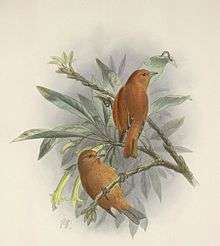Loxops
| Loxops | |
|---|---|
 | |
| The extinct Oʻahu ʻakepa, Loxops wolstenholmei Male above, female below. | |
| Scientific classification | |
| Kingdom: | Animalia |
| Phylum: | Chordata |
| Class: | Aves |
| Order: | Passeriformes |
| Family: | Fringillidae |
| Subfamily: | Carduelinae |
| Tribe: | Hemignathini |
| Genus: | Loxops Cabanis, 1847 |
| Species | |
|
see text | |
Loxops is a Hawaiian honeycreeper genus in the finch family, Fringillidae.
The genus contains the following species:[1]
- ʻAkekeʻe (Loxops caeruleirostris)
- Hawaiʻi ʻakepa (Loxops coccineus)
- Oʻahu ʻakepa (Loxops wolstenholmei) (extinct)
- Maui ʻakepa (Loxops ochraceus) (extinct)
- Hawaiʻi creeper (Loxops mana)
Characteristics
Loxops average the size of 11 cm. They are considered a finch-like bird that also have a notched tail. Their bills have a cone shape to them and they are pale blue with a dark tip. They are also hard to find in the field. Males typically are a darker shade of green on the top while their belly-side is yellow. They also have a black mask that covers their face up until behind its eye while its forehead, forecrown, and backside is also yellow. Females resemble the same colors as the males, but the colors are muted and less vibrant.[2]
Breeding
The Loxops commonly breed during the months of March and April and possibly during the months of February to June. The nests of the Loxops are found in the `ohi`a trees.[2]
Information
The Loxops are considered an endangered species while its population has been rapidly declining over the last ten years. The Loxops are mainly located in Kaua`i in the Hawaiian Islands, USA. Modern developments that take over the environment are threatening the Loxops and reducing their habitat availability in the Koke`e region. A lof of the current region of the Loxops is protected by Alaka`i Wilderness Preserve and, to some extent, by Koke`e State Park.[2]
References
- ↑ Gill, Frank; Donsker, David (eds.). "Finches, euphonias". World Bird List Version 5.3. International Ornithologists' Union. Retrieved 23 July 2015.
- 1 2 3 "Akekee Loxops caeruleirostris". Bird Life. Retrieved 21 December 2012.